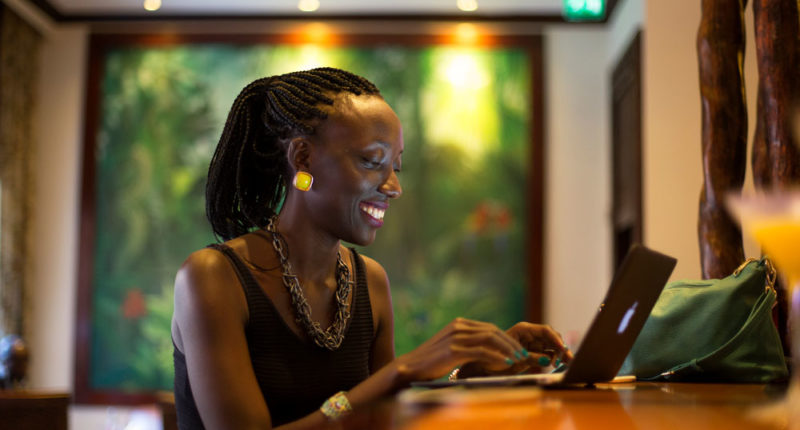The eatery I enter into in Kampala that Saturday afternoonis teeming with people. A snack here, a meeting there…the place is a hive of activity. For Kampala’s burgeoning middle class, these eateries have also become convenient work stations and meeting points. It is here that I am supposed to meet Usher Komugisha for our scheduled interview.
“This is my office whenever I’m in Kampala,” she tells me, with sarcastic laughter. But her ‘office’ is also many other people’s, and soon, it is evident that we may have to look for a more convenient venue for our interview. We finally settle for a secluded, serene and rustic hotel, able to provide us an ideal ambience for our conversation.
So who is Usher Komugisha? I ask. “That’s a difficult one,” she says with a shy smile before adding, “Usher is a Ugandan sports Journalist.” She strongly emphasizes the ‘Ugandan’.
Thanks to her mobility, her nationality, an otherwise basic identity for anyone else, hasn’t always been as obvious. Oftentimes, she’s been thought, and referred to as a Rwandan sports journalist. “I was born in and worked in Uganda until August 2013, when I got a job in Kigali. Perhaps because I report from there, people may be forgiven for thinking me Rwandan,” she clarifies.
Born 29 years ago in the small mining town of Kilembe in present day Kasese District in Western Uganda, Usher attributes her early interest in sports to her athletic parents. “I played almost every sport growing up,” she says. “I started with cycling around home, then because our home was near the Kilembe golf course, I gradually picked an interest in golfing. At school, I was particularly good at dodge ball, commonly known as kwepena(her peers long referred to her as kwepenaQueen), and athletics, where I competed at the district level,” she recounts. None of the above, however, qualifies for her favorite sport. That special place is reserved for Basketball, which she took on much later at Kibuli Secondary School. “Our coach, Eric Malinga, is one of the most celebrated Basketballers in Uganda, and he used to inspire us a lot. So, I continued to play Basketball even after leaving Secondary School, featuring for Makerere Sparks and UCU lady Canons in a career spanning 10 years,” she says.
The wide-ranging interest in sports would become the fuel for a career in sports journalism, which the adult Usher would become famed for, reporting and commentating on sports as invariably as she had played them.
This career switch would begin with a random invitation to Power FM studios in October 2008, to listen to renowned pundits Joseph Kabuleta and Mark Ssali do their traditional sports show. Usher, without warning, was asked to speak on air about basketball, which she was then playing. She impressed, and on the recommendation of Kabuleta, found herself in the New Vision newsroom reporting sports the following year.
She would abandon her degree program at Makerere University in the process, after coming to the conclusion that it did not rhyme with her passion. “I was studying for a Bachelor of Arts in Economics degree but I did not see myself pursuing a career in that field, so, I abandoned it,” she explains.
With her eyes now set on a career in Journalism, she instead enrolled for a Bachelor’s degree in Mass Communication at Uganda Christian University (UCU). Like the Economics before it though, Mass Communication too would not contain Usher’s restlessness for long. She opted out barely a year into the program, arguing that it was “too general” for her. “I wanted something more specialized, say Sports Journalism or Football Journalism, which I was now focused on pursuing,” she explains.
With academic demands out of the way, or at least shelved, and her journalistic career picking up, an opportunity knocked: The International Sports Press Association (ISPA) and Federation for International Sports in Universities (FISU) were looking for two upcoming sports journalists to mentor from different continents, and Usher would be selected from Africa alongside a Senegalese, to go to the World University Games in China.
“This was a huge event, involving representatives from almost all sports Federations in the world, and you had to do your best in the assignments to be noticed,” she narrates. At the end of the programme, she earned a recommendation from the ISPA to cover the 2012 London Olympics. “This was overwhelming for me,” she admits. “When I started out at Power FM, I never dreamed of covering the Olympics. Yet here I was, coming up close with iconic stars such as Lebron James and Kobe Bryant among others. As a sports reporter but more importantly as a basketball fan, this was the ultimate dream.”
The Olympics were not just about rubbing shoulders with the stars however. For Usher, now motivated to scale even bigger heights, they were also a lesson in work habits. “I met journalists who had covered over 20 Olympics. They would file their stories instantly at a conference, breaking the stories even when you were at the press conference together,” she says. As a lesson, she says, “I learnt that urgency in the news industry is critical, and that if I was to survive as long as those guys had, I had to make it part of my professional ethics.”
Yet despite meeting many female sports journalists in London, she remained for long the sole female sports reporter in the New Vision newsroom. Pioneering in the male-dominated world, she admits was not easy. “It did not matter that I had played most of these games. At the end of the day, I was a female, reporting on a male-dominated industry, and it would take time for people to respect my opinions I had to be on top of my game, research, and work doubly hard.”
With time, Usher chose to specialize in reporting on African football. Even here, in a country where European football retains the most appeal, her choice was no less daring. It was as much a decision about choosing an identity as it was about giving voice to her nationalistic sentiments: “I wanted to find a niche as a reporter, but I was also for a long time convinced that African football was underreported, and that’s why it remained less popular compared to European leagues, even in its own backyard. I, therefore, wanted to give it a voice.”
As Usher’s career grew, so did her career ‘suitors’. She started by corresponding for international sports websites whose only knowledge of her was her stories online, and soon, sports giant Super Sport came calling. Now, she writes and produces content for their website Supersport.com, corresponds for the UK-based The Guardian Daily, and the Federation of International Basketball Association (FIBA). How she juggles all, she shares; “It is difficult, but for now, I am lucky that I work for companies that appreciate the overlapping nature of sports. For example, when I go to cover say afro-basketball qualifiers in Egypt for FIBA, I stay for a while longer after the tournament doing personal research on African football. So, it requires personal sacrifices as well as building trust with your employers,” she says.
With now over six years of experience covering African sport, Usher has become an authority on the subject, covering every major sporting event. She believes that Africa, and Uganda in particular, can do better as regards sports development. “Here [Uganda], sports is still perceived as leisure yet it has now become an industry employing thousands of people, and government needs to invest in it like it invests in other sectors,” she notes.
She invokes the example of South Africa. “Because of their vast investment in sports infrastructure, big money companies such as Toyota are now investing in their football league, which means that the Players will earn more. Here [Uganda], a footballer still earns less than $100. Can you imagine that!” she exclaims, with a tinge of anger.
Usher, nonetheless, acknowledges that investment in sports goes beyond paying decent salaries and building decent infrastructure. “Last year, for example, Rwanda hired two football analysts from Opta (a U.K. data site) and Bournemouth to prepare the team for CHAN. They watched Gabon’s (one of the teams in the same group with Rwanda) last five games, and noticed that there was a player on the left flank who tried to trip whoever ran at him. So, when the two teams finally played, the Rwandan winger kept running at the Gabonese defender until the latter tripped him and got sent off, enabling Rwanda to win 2 – 1 to qualify for the quarterfinals!”
“Had we done the same for the team in AFCON, for example, may be things would have been different,” she argues. “These are the little details that often make all the difference.”
It is evident that this is more than a job for Usher. As she reminisces on the numerous sporting events she has witnessed and covered – from Usain Bolt’s sensational sprint at the 2012 London Olympics, to the intricate corridors of Africa’s nascent football leagues, there is an almost burning motivation that spurs her on. “I really want to tell people’s stories. There are many people who struggle, put in their all to succeed in sports against extraordinary odds, especially here in Africa where Sports is still underdeveloped. Their stories inspire me to keep telling that story,” she says.
Indeed, almost all Uganda’s sporting peaks – from John Akibua’s Gold at the 1972 Munich Olympics, Leo Rwabwogo’s boxing heroics to the latter day Kipsiro and Kiprotich triumphs have largely been the products of immense personal sacrifice and discipline.
Usher argues that Uganda is capable of producing more such champions, but the country needs to start taking sports seriously. “For instance, after Gabon, have the football authorities here sat down to plan on how we can not only qualify but also fare better in Cameroon in 2019? It is this kind of long term planning that defines champions,” she insists.
True to form, Usher is thinking long term. For the next five years, she’s set herself a target to tell stories and also mentor and inspire more female story tellers like herself. “Some are already in the field working and I occasionally meet them to share experiences. Hopefully, I can inspire one or two of them to live their passion, just like I’ve tried to live mine,” she says.
After all, she too has not been without mentoring. She speaks fondly of Kenya’s Evelyn Watta, a CNN Africa Sports Journalist of the year (2014) and co-founder of sports site ‘Sports News Arena’ now serving as the Vice President of the International Sports Press Association based in Madrid. “She inspires me,” she says. Locally, Mark Ssali and Joseph Kabuleta still hold a special place in her heart, even though they have now moved on from sports commentary.The sun is by now setting over our interview and Usher already has her sights firmly set on a tight schedule ahead. She would be off to Russia for the FIFA Confederation Cup in June, and the UEFA Women’s European championship in July, then onto the IAAF World Athletics Championships in London in August. About the secret to her immense energy, she says, “You must do what you love and enjoy. People sometimes ask me if I ever get leave, but I tell them, my work is also my leisure. Like when I’m in a stadium, I’m enjoying the game as much as I’m working.”









